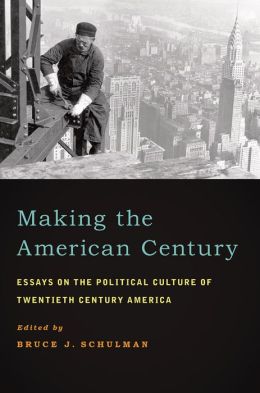Schulman Edits New Book–Making the American Century
Oxford University press has just published Making the American Century, a collection of essays on the political culture of 20th Century America, edited by Professor Bruce Schulman. “Are the American people a nation,” Senator Albert Beveridge asked in 1898, or are they “an aggregation of localities?” Beveridge had little doubt that the new century would witness the triumph of what he called “national life.” Theodore Roosevelt shared his young compatriot’s faith in America’s destiny to forge a mighty nation-state and array itself among the world’s great powers. Forty-three years later, when publisher Henry Luce proclaimed the American Century, the work of nation building seemed well advanced. The United States had amassed the economic resources, the political and military strength, and the moral prestige to assume global leadership. By century’s end, however, both the trajectory of American politics–the sense of ever waxing federal power–and the nation’s place in the world seemed less assured. Americans of many stripes came to contest the standard narratives of nation building and international hegemony, the seemingly inexorable movement that Beveridge and Roosevelt imagined and that subsequent generations dutifully charted.
In this volume, a group of distinguished historians revisit and revise many of the settled verities of American political history. They reconsider and re-frame four familiar binaries that have long defined the history of twentieth century America: the local versus the national, the public sphere versus the private sector, domestic affairs versus international relations, and liberal versus conservative. In so doing the authors blur the boundaries among political, cultural, and economic history. For many years, the field of modern U.S. history suffered from a kind of schizophrenia: while it long nurtured a large body of traditional political history (studies of key figures, movements, court decisions, and policy innovations), it also stimulated innovative work in social and cultural history. These two approaches enjoyed little in the way of productive dialogue.
In recent years, however, historians have reinvigorated political history. Blending politics with social and cultural analysis, this new approach pays close attention to the ways politics and public policy structure everyday life. This new political history thus combines policy analysis with an understanding of the people who made them and whose lives were affected by them. The contributors to this book advance this important scholarly enterprise.
